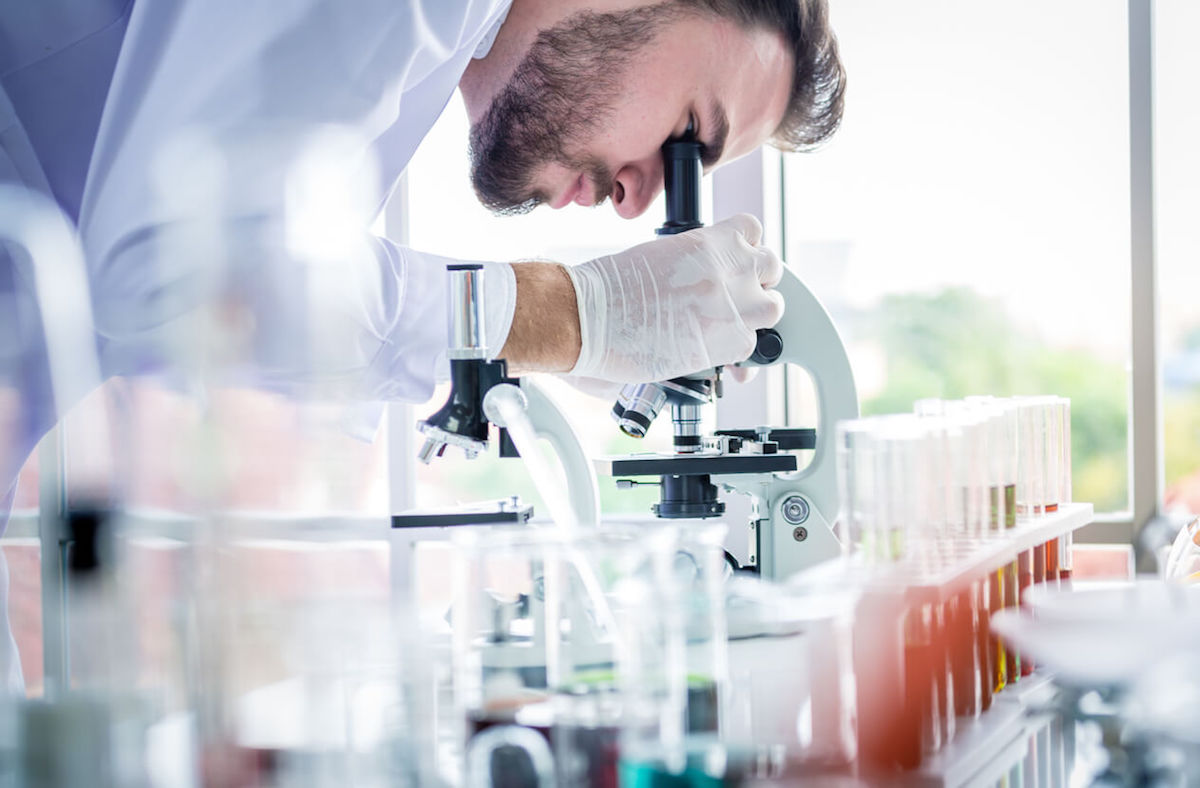If you’re considering a career in biotechnology, you likely know that you’ll need to earn a related degree, such as a Master of Science in Biotechnology, in order to land the most competitive and high-paying jobs in the field. Even entry-level biotechnology positions increasingly require a master’s degree for consideration.
In comparing graduate biotech degrees, there is a lot to consider. What does the curriculum entail? Are courses taught by academics or by professionals who have actually spent time working in the field? Does the program offer experiential learning opportunities, such as co-ops, internships, or independent research? And, increasingly: Does the program offer a concentration in the specific industry or type of work you want to pursue after completing your degree?
In most cases, choosing a concentration is elective rather than required; however, declaring a specialization can be a highly effective means of differentiating yourself from other applicants seeking similar positions after graduation. Pursuing a degree concentration demonstrates to employers not just proficiency in biotechnology’s core tenets but also that you deeply understand the ways those tenets apply to your industry or role. Potential employers often value concentrations because they reduce the amount of training employees require during onboarding and allow them to bring deep expertise to their team.
Download Our Free Guide to Advancing Your Biotechnology Career
Learn how to transform your career in an industry that’s transforming the world.
“One of the things that we think about when we develop degree concentrations is helping students answer the question, ‘What job do I want to get after I graduate?’” says Jared Auclair, associate dean within Northeastern’s College of Science. “The concentrations are designed to fit specific roles within in the industry that students can select.”
Below is a look at some of the common biotechnology concentrations you may encounter during your search, as well as advice you can use to make sure you are choosing the right concentration for your goals.
Biotechnology Concentrations at Northeastern University
Auclair notes that prospective students will find that most biotechnology concentrations are focused on the biopharmaceutical and drug development spaces.
However, many universities, like Northeastern, are increasingly expanding their offerings to be more inclusive of the breadth of work available in the field of biotech, including biodefense, agriculture, and more.
1. Agricultural Biotechnology Concentration
Students interested in agricultural biotechnology (also known as agritech) may consider the agricultural concentration, which teaches students the essentials of plant, animal, food, and ecological biotechnology. This concentration is ideal for those interested in working in a field related to agriculture after graduation.
2. Biodefense Biotechnology Concentration
The biodefense concentration is focused on preparing students for a career that marries biotechnology with national defense. Coursework includes material on homeland biodefense, bioterrorism, biowarfare, and bioethics, among other areas.
3. Molecular Biotechnology Concentration
Students interested in the intersection of molecular biology and biotech may be well-matched to the molecular biotechnology concentration. This concentration seeks to build student understanding in molecular biotechnology as well as protein expression and structural biology. Students who pursue this concentration learn how to generate and optimize molecular forms used to express recombinant proteins to be used as biopharmaceuticals.
4. Process Sciences Biotechnology Concentration
The process sciences concentration brings together biochemical engineering, mammalian cell culture process development, and protein purification to teach students the principles of biological manufacturing processes.
5. Manufacturing and Quality Operations Biotechnology Concentration
This concentration is specifically designed to train students to master quality control methods leveraged in the production of biomedical products. Students walk away with skills they can leverage in the research, discovery, development, and manufacturing of biopharmaceuticals.
6. Biopharmaceutical Analytical Sciences Biotechnology Concentration
This concentration focuses on the diversity of molecular forms derived from the biological products through various biological and chemical mechanisms and the impact of these structural changes on the safety and efficacy of these biopharmaceuticals.
7. Pharmaceutical Technologies Biotechnology Concentration
The pharmaceutical technologies concentration focuses on the conversion of purified proteins to biopharmaceutical drug products compatible with clinical use. This concentration addresses the product formulation design and the development and implementation of the drug product manufacturing processes. Students learn the sciences of the interactions of the biologic molecules in the process conditions and the relevant process technology, such as aseptic operations and freeze-drying, needed for drug product manufacturing.
8. Scientific Information Management Biotechnology Concentration
The scientific information management concentration is designed to marry biotechnology with data science. As such, the concentration focuses on the collection, analysis, and visualization of scientific data. This concentration addresses the issues surrounding big data that face the industry today. Students learn how to manage, store, visualize, and provide an overall analysis of large scientific data sets.
9. Regulatory Science Biotechnology Concentration
Students interested in a regulatory-focused biotechnology role would be well-served by completing the regulatory science concentration, which is heavily focused on the science of compliance related to the field.
10. Biotechnology Enterprise Concentration
The biotechnology enterprise concentration was explicitly designed for students interested in the business of biotechnology. The concentration includes coursework about business and management essentials, as well as leadership, entrepreneurship and innovation, financial decision making, marketing, and more.
Choosing the Right Biotech Concentration For Your Goals
If you are unsure which biotechnology concentration is right for you, Auclair has some relatively straightforward advice.
“Students should pick a concentration based on what they want to do in the industry,” he says.
Auclair notes that some students might feel pressured to choose and commit to a concentration as a part of their studies. However, while completing a concentration can bring many benefits, it isn’t something that should be particularly stressed over, he says. Concentrations are simply designed to give students deeper background on a particular focus area to prime them for roles in that field—but not pigeonhole them into that field for the rest of their careers.
“I would encourage students to keep an open mind while considering concentrations,” Auclair says. “Take the classes, see what interests you, pick a concentration, and don’t be afraid to change from your original perception if your interests change. You can always change positions and jobs within the industry, even if that requires an additional certification down the line.”
Auclair notes that Northeastern University’s Master of Science in Biotechnology offers one of the broadest and most diverse programs in terms of both individual course offerings as well as available concentrations.
“It can be intimidating and confusing to students, but it’s really meant to highlight all the different options of jobs that they can get after they graduate and to give them the opportunity to explore those things and figure out where their interests lie,” Auclair says. “Instead of being intimidated, take advantage of that variety to find an area that you are truly passionate about.”







Related Articles
Compliance Specialists: Who They Are and What They Earn
Science or Science Fiction? The Future of Personalized Medicine
In-Demand Biotechnology Careers Shaping Our Future